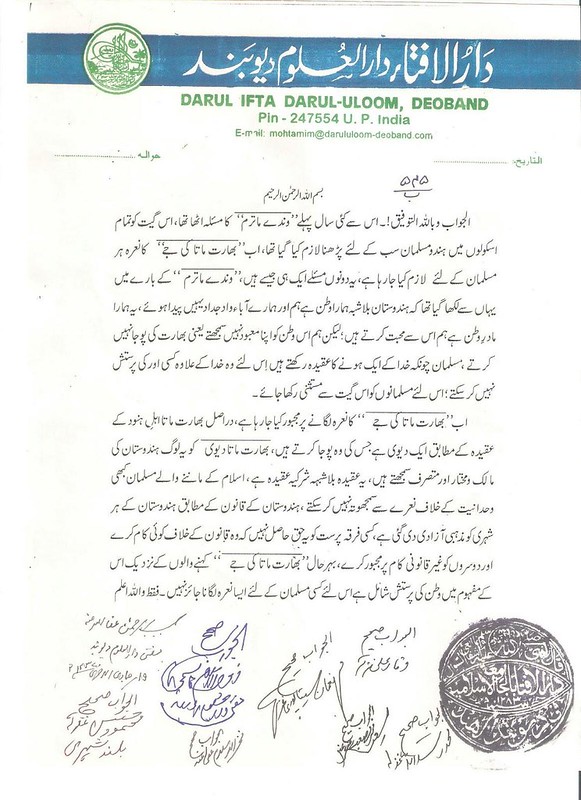By Umair Azmi for Twocircles.net
An opinion piece in the Indian Expresspublished on April 22 asks Indian Muslims to flout the fatwa of the Darul Uloom (Deoband) Islamic seminary. Doing so is the democratic right of the author, but the arguments make for an interesting reading, especially if the position held by the author—of a IAS officer—is also kept in mind.
The first paragraph itself resorts to a lie, by claiming that “the fatwa states that only a human can give birth to a human and therefore, the country cannot be called “mother”” No such statement is to be found in the fatwa. But it makes one wonder- what was the need for this concoction at all? Could the argument not have been made without resorting to such underhand tactics? Or is it just a matter of habit: after all, as the cases of numerous Muslims incarcerated in jails on terror charges show, the officers of investigating agencies are more proficient in manufacturing “facts” than in investigation.

Something more sinister may possibly be at play. The Jamiat Ulama e Hind has been at the forefront in providing legal help to those incarcerated under fictitious terror charges. Though the organisation is independent of the Darul Uloom seminary, owing to the common faces (Maulana Arshad Madani, head of one of the factions, is also a teacher at the seminary), people often conflate the two. Could this be one of the reasons why the seminary happens to be in the cross-chairs of the investigating agencies? One should not be surprised if that is indeed the case.
One also wonders about the editorial judgment of the newspaper that publishes opinion pieces on a text, but never publishes the complete text in question.
The writer states that “The role and duty of the leadership of a community should be to give solutions and bring clarity to issues.” Is that not what this fatwa does – bring clarity to the question, whether the slogan is consonant with the Islamic creed? That the clarity is not to the liking of the author is another matter.
“Over the years, they have weakened the position of Muslims as citizens and made them suspect in the eyes of others.” In the eyes of whom? The general masses of India? If so, is it not more an issue that the masses need to ponder over as to what sort of depraved mentality reduces patriotism to a mere slogan? Or is it his own fraternity – the investigating agencies – that the author has in mind? If so, should it not be a cause to call for a change in the unprofessional attitude of the officers who operate based on prejudices against certain communities?
The author also claims that they have come up with a straitjacketed theory that if a Muslim chants the slogan, he would lose his religion. Another slander. While it may not immediately be obvious to non Muslims, every Muslim with even a rudimentary interest in his religion knows too well the difference between an act being “against Islamic precepts” and an act causing one “to go outside the fold of Islam”, i.e., lose his religion. As an illustration, almost every average Muslim would, if asked regarding movies, would answer that considering the usual contents, watching it goes against Islamic principles, and would constitute a sin. But no one would claim that watching a movie causes one to “lose the religion”. On the other hand, for one who denies one of the fundamentals of the faith, such as the Unity of God, or the Last Day, he/she would be considered outside the fold of Islam. In other words, such proclamations would be considered to cause one to “lose the religion”. That the author mixes them up, points to his ignorance, or worse, deceit.
It is ironical that the author says that “historically, the political and religious leadership of Muslims in India has not helped them to come to terms with the changing times”. For if he had any sense of history, he would not have ignored that “Bharat Mata ki Jai” is a substitute for “Vande Mataram”, nor would he have ignored the fact that the later stanzas of the song explicitly equate the motherland with the goddess Durga. He would also not ignore the virulently anti-Muslim theme of the novel that popularised the song, Anandamath. Did it ever occur to the author, that people who are not at all concerned with how the matter stands vis-a-vis Islam, but who do have a sense of history and context, may also object to the slogan?
In normal times, a “caged parrot” delivering homilies on the sense of citizenship, history, etc. would sound comic. But with people who idolize fascists in power, such love songs to the powers that be should be a sign of grave concern.
Umair Azmi is a computer engineer by profession, with a master’s degree from the Indian Institute of Science, Bangalore. He lives in Gurgaon.

